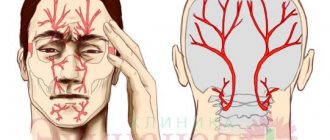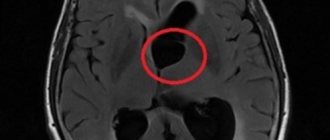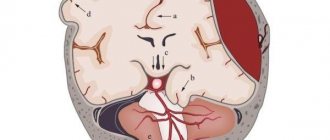If there is a person in your environment who is prone to sadness, unexpected attacks of rage, or sudden fear, keep in mind that he may suffer from epileptoid-type psychopathy. Such individuals literally “poison” the lives of their loved ones, it is impossible to get along with them, they will always look for negativity in order to “explode.” The doctors at our Leto mental health center have extensive experience in treating such patients. 8(969)060-93-93 is our phone number, call us, we will tell you more about the pathology and will definitely help
Total information
From the outside it may seem that a person with epileptoid type psychopathy “only” has a bad character, he was poorly raised, and he does not want to coexist normally with other members of society. There is some truth in this - the disorder is formed under the influence of many factors, including due to improper upbringing. But a bad character can be corrected without the intervention of specialists, meanwhile, an epileptoid psychopath will need medical help.
Some clinicians consider epileptic psychopathy not a disease, but a variant of the norm. In psychology and psychiatry, it is believed that for a verdict “he is sick” it is necessary to constantly observe a number of clearly defined symptoms, meanwhile, epileptic psychopaths often behave without any peculiarities. In any case, they will need the help of a specialist, since without his intervention, gross personality disorders of a person may manifest themselves, because of which his environment suffers. In our center we provide such assistance - deviation interferes with a comfortable life.
Pathogenesis and etiology of the disorder
A clear cause for the disorder has not been identified, but according to some theories, it may be caused by the following factors:
- The surrounding society
. Most epileptoids grew up in an environment where aggressive behavior combined with violence is considered the norm. As children grow older, they acquire the same traits as adults. - Heredity
. The etiology of epileptoid psychopathy may involve a factor of genetic predisposition, as a result of which the disease is transmitted to children from the mother or father. - Brain Chemistry
. Serotonin (the pleasure hormone that prevents depression) functions in such patients, perhaps differently than in healthy people. - Birth injuries and head injuries
cause the development of epileptoid psychosis as a compensatory reaction. - Infectious diseases of the central nervous system
.
The epileptoid type of character accentuation can also develop due to the following reasons:
- Sexual or physical abuse
. People who have experienced such humiliation have an increased chance of developing this psychopathy. - Other types of mental disorders
. People with any other antisocial disorder, including disruptive behavior, are also at risk.
Peculiarities
Signs of epileptoid type psychopathy are often found in other diseases. Thus, they manifest Alzheimer's disease - the most common type of dementia, which occurs due to the fact that the brain is unable to perform its physiological functions. But with the described disorder there are no organic disorders - morphological changes at the level of cells and tissues, and symptoms can disappear under certain circumstances, which cannot be said about Alzheimer's disease.
Our doctors with many years of experience indicate that such patients have developed intelligence - thus, they can succeed in the scientific field. If you change their environment, the pathological symptoms disappear. This means that they do not have any irreversible mental disorders; they simply behave like antisocial individuals who did not like their environment.
Unstable type of psychopathy (unstable psychopathy)
The unstable type of psychopathy most often manifests itself in prepubertal age. Such children exhibit weakness of will, volitional delays, increased suggestibility, instability of interests, superficial judgments, frivolity, increased desire for pleasure, and a thirst for new experiences. Children do poorly at school, quickly fall under the influence of specific asocial companies, leave home and school, wander, smoke, drink alcohol, and use drugs. In companies they always play a subordinate role. Unstable psychopathy is often based on psychophysiological infantilism.
Causes
They have not yet been fully studied - it remains unclear why, under the influence of a number of reasons, one person was diagnosed with epileptoid psychopathy, while another never experienced its manifestations. Experts are inclined to believe that it is more advisable to take into account the factors against which this deviation occurs. Those are physiological and social, most often this disorder occurs when they are combined.
Physiological factors under the influence of which one should beware of psychopathy of the epileptoid type are:
- burdened heredity - the presence in the family of those who are also diagnosed with this disorder;
- brain diseases;
- previous traumatic brain injuries (TBI) and their consequences;
- chronic somatic diseases.
Our specialists, based on many years of experience working with such patients, indicate that the risk of developing the described disorder is higher in people who have been diagnosed with brain pathologies. This:
- encephalitis - inflammatory damage to brain tissue;
- encephalopathy - degenerative-dystrophic changes in brain tissue;
- stroke - cerebrovascular accident;
- tumors are neoplasms (both benign and malignant).
Of the somatic chronic diseases, endocrine and metabolic disorders are of greatest importance. The chances of developing epileptoid type psychopathy increase if you are diagnosed with:
- diabetes mellitus - a disorder of carbohydrate metabolism due to insufficient synthesis of insulin (a pancreatic hormone);
- hyperthyroidism - increased production of thyroid hormones.
We specialize in mental disorders, but, according to one of the most important tenets of medicine, we treat not a disease, but a person. We have established connections with clinical specialists who will help cope with somatic diseases that can become an impetus for the emergence of epileptoid-type psychopathy.
Social factors that increase the risk of developing epileptic psychopathy are usually significant if they influenced the individual in childhood. This:
- growing up in a dysfunctional family;
- personality suppression;
- bullying by others;
- failures when communicating with members of the opposite sex (manifested equally in women and men);
- lack of understanding from peers and so on.
Most often, the child who grows into an epileptoid psychopath does not receive additional attention and love. Our doctors carefully question the patient and his relatives about his life background - this allows him to choose the right treatment tactics.
Schizoid psychopathy (austic psychopathy)
Children with schizoid psychopathy already at an early age exhibit developmental dissociation, which consists of advanced speech, mental and intellectual functions against the background of delayed development of psychomotor skills. Children usually begin to read and count early, and are interested in non-childish and abstract problems. Subsequently, their hobbies may be of an extremely valuable and highly specialized nature. At the same time, their motor skills are inhibited, children master self-care skills late, and do poorly in labor and physical education classes. Children with schizoid psychopathy do not participate in noisy games and do not feel the need to communicate with peers. Emotional coldness in such children is combined with sensitivity. Unlike schizophrenia, they do not have progression and mental disorders.
Symptoms
Characteristic manifestations of epileptoid type psychopathy are :
- attacks of bad spirit;
- unexpectedly “rolling” melancholy mood;
- tendency to angry attacks;
- sudden fear.
All of them usually manifest themselves in relation to others - an epileptoid psychopath will not become angry with himself if no one is nearby. This suggests that the described deviation is more likely social than medical.
At first, attacks of aggression are unexpressed; on the other hand, they can arise in response to actions that would not provoke any negative reaction in ordinary people. Patients are especially aggressive when intoxicated - when they get drunk, they demonstrate anger and resentment that they may have been harboring for some time.
Such individuals exhibit characteristics whose presence makes it impossible to diagnose this pathology, but which will help in identifying it. This:
- high vital activity;
- the desire to constantly engage in any significant activities;
- maximalism in everything - a person selflessly both loves and hates;
- intolerance to other people's opinions;
- authoritarianism;
- inflexibility when resolving any issues with other people;
- demandingness - among despotic leaders there are a lot of epileptoid psychopaths;
- paranoid reactions - increased suspicion in everything.
Also characteristic:
- desire to eat deliciously;
- healthy sound sleep;
- pronounced libido - the same in men and women;
- inability to live in disorder.
The life of an epileptoid psychopath is not particularly prosperous. Due to conflicts in the family, they are divorced, and employers fire them at the first opportunity. It is difficult for them to make friends - no one wants to tolerate the presence of an embittered person next to them, “exploding” with rage.
Epileptoid psychopathy: reflection on humans
09.12.2019
Personality traits of a person with epileptoid psychopathy include a tendency to conflict, sudden mood swings, the ability to remember unpleasant moments, and aggressiveness. People with this disorder are quite vindictive; you should beware of them, as attacks of aggressiveness can occur at any time.
Epileptoids are characterized by increased appetite, sound sleep with difficulty waking up, absence or increased sexual activity in the absence of modesty. Epileptoids are realists; they are incapable of making plans, dreams and fantasies.
People with an epileptoid personality type are distinguished by a strong athletic figure, a rounded face , enlarged jaws, a massive torso, and shortened and strong limbs.
The personality traits of an epileptoid are similar to those changes that occur with epilepsy, only they are less pronounced. There is an assumption that these features are a compensatory reaction that occurs with shallow organic damage to the brain in the prenatal period.
Epileptoids are capable of accumulating irritability for a long time, although some minor event becomes the reason for a sudden outbreak of aggression. Attacks of epileptoid psychopathy can be observed from early childhood. Children are noted to be tearful, prone to sadism, and merciless towards animals and those younger than them. Children with such psychopathy are terrible owners; they are characterized by meticulous accuracy.
During puberty, more pronounced symptoms of psychopathy appear. Epileptoid teenagers are merciless, angry, cynical and cruel. During this period, dysphoria, periods of low mood and irritability, are especially pronounced, during which adolescents come up with a wide variety of reasons for causing a scandal.
With explosive psychopathy, increased sexual desire is manifested. However, epileptoids are capable of often refraining from casual sexual intercourse due to increased concern for health and fear of contracting infectious diseases.
People suffering from this psychopathy are terribly jealous; even the slightest flirtation on the part of their chosen one can lead to an outburst of anger. When drinking alcohol, epileptoids do not know the limits, they are able to drink until they lose consciousness, and after severe alcohol intoxication they do not remember what happened to them in this state.
Epileptoids are prone to suicidal behavior, but not for the purpose of demonstration, like hysteroids, but for blackmail or punishment of the object of jealousy.
The etiological factors of epileptoid psychopathy are divided into biological and social. Causes include traumatic brain injury , hereditary predisposition, individual character traits, brain injuries received during passage through the birth canal, and some infections suffered in early childhood.
Social factors include negative influence from loved ones, upbringing in an antisocial family, emotional trauma, and drug use.
psychotherapy is used to treat this condition . These methods are quite effective and can be used both in medical and educational institutions. For children in adolescence, labor methods of education can be used as a way to effectively train the nervous system , as well as organizing the correct daily routine.
Sedatives are used among medications. They inhibit excitation processes in the cerebral cortex , stimulate sleep, reduce anxiety, and can be used for pain relief.
Antipsychotic drugs are also used. They can be used to treat psychosis. They have a calming effect, reduce sensitivity to external stimuli, and are able to suppress delusional states.
Antidepressants are also used to treat epileptoid psychopathy . This group of drugs can help prevent the development of depressive conditions. To prescribe any medications, you will definitely need to contact a specialist - a psychiatrist .
Published in Psychiatry Premium Clinic
Cost of services
| CONSULTATIONS OF SPECIALISTS | |
| Initial consultation with a psychiatrist (60 min.) | 6,000 rub. |
| Repeated consultation | 5,000 rub. |
| Consultation with a psychiatrist-narcologist (60 min.) | 5,000 rub. |
| Consultation with a psychologist | 3,500 rub. |
| Consultation with Gromova E.V. (50 minutes) | 12,000 rub. |
| PSYCHOTHERAPY | |
| Psychotherapy (session) | 7,000 rub. |
| Psychotherapy (5 sessions) | 30,000 rub. |
| Psychotherapy (10 sessions) | 60,000 rub. |
| Group psychotherapy (3-7 people) | 3,500 rub. |
| Psychotherapy session with E.V. Gromova (50 minutes) | 12,000 rub. |
| TREATMENT IN A HOSPITAL | |
| Ward for 4 persons | 10,000 rub./day |
| Ward for 3 persons | 13,000 rub./day |
| Ward 1 bed VIP | 23,000 rub./day |
| Individual post | 5,000 rub. |
| PETE | 15,000 rub./day |
This list does not contain all prices for services provided by our clinic. The full price list can be found on the “Prices” , or by calling: 8(969)060-93-93. Initial consultation is FREE!
Treatment
Psychotherapy is usually involved. Thanks to a competent doctor (and these are the ones who work at the Leto mental health center), it is possible to stabilize the condition of a patient with epileptoid-type psychopathy - attacks towards others stop, he learns self-control, and if a situation arises that provokes an attack of rage, he protects himself from others so as not to take out anger on them.
Group and individual events are held. During the first, epileptic psychopaths learn to interact with each other, during the second, they reinforce such skills with the help of individual conversations.
Drug therapy is used if necessary - this is symptomatic treatment. It means that it is aimed at the manifestations of pathology - psychotherapy is effective in relieving it. Medications usually include sedatives, antipsychotics, and antipsychotics.
Doctors at the Leto mental health center have all the knowledge and skills to overcome this pathology. Call the phone number 8(969)060-93-93 , and our consultants will tell you where to start to get rid of this unpleasant condition.
Symptoms at different stages of growing up
The disease manifests itself in different ways - it all depends on age. If you know these nuances, you can prevent further progression of psychopathy. And the sooner you start treatment, the better.
As you get older, epileptic psychosis manifests itself as follows:
- The child
is an epileptoid. A child with this disorder may cry for a very long time, even for several hours, and it is impossible to calm him down. Such children want to be a tyrant in games, dictating the rules. They love to surreptitiously torment the younger ones and those who cannot give them back, and abuse their pets. These are “difficult children”, fighters who do not get along well in a children's group. In elementary school, children with such psychopathy are distinguished by “hypersocial” traits: excessive accuracy when filling out copybooks and notebooks and careful handling of their belongings. - The teenager
is an epileptoid. The most highly excitable psychopathy manifests itself at the time of puberty. At this age, sick teenagers are characterized by dysphoria - anger, apathy, and a sullen appearance. Teenagers themselves look for reasons to incite conflict. Even a slight restriction of freedom can lead to an attack of aggression. Such teenagers are characterized by harsh language and cruelty, and sometimes a tendency to self-harm. Such teenagers often become pyromaniacs and dromomaniacs. - Adult
psychotic. By the time they are growing up, psychopaths begin to exhibit antisocial and illegal behavior, and practice alcohol abuse or debauchery. Some patients by the age of 30 can eventually learn to control their outbursts of anger - then they interact with society without problems. The majority ends up in colonies and prisons, where they play the role of informal negative leaders.











